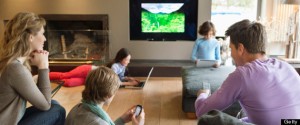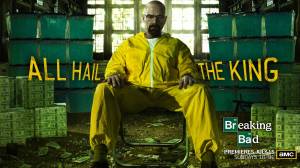Posts Tagged technology
Screen Exposure: Advantageous or Abhorrent?
Posted by roberto1810 in Media, People, Social Media, Technology, Television on January 8, 2014
It doesn’t matter if you approve or don’t, screens are now inextricably woven into the fabric of everyday life, and they’re here to stay.
It happened the other night. We (a group of four students) settled in to watch a TV show together, the final of I’m A Celebrity… (no judgement please). Halfway through the show I looked at the room, which had gone silent beyond the odd chuckle. I quickly realised why; between the four of us we were simultaneously using four smartphones, two laptops and two tablets, whilst ‘watching TV and chilling with friends’, which of course would’ve been the official party line had anyone asked what we were doing. It was in that moment I truly realised how digitised my generation has become; I can genuinely only think of two situations in which I am not constantly dipping in and out of various apps on my iPhone: 1) when I’m driving and 2) when I’m asleep.
This isn’t even exclusive to our particularly digitised demographic (i.e. young adults); in 2012 Google produced a study stating that 90% of the population’s media consumption was now screen-based, and beyond that, multi-tasking was reaching its pinnacle… 77% of the time we spend watching television was also spent using another device, such as a tablet or smartphone. A mere six months later, this infographic showed that those figures had risen again. The tide hadn’t so much turned as unleashed a tsunami upon the coast of the first world.
As with any new cultural trend, a discussion immediately erupted; for every person essaying the positives of this shiny, new digital world, there were naysayers concerned about the potential longer term developmental issues. However, the fact of the matter is that arguments about how good or bad this new global addiction is are somewhat irrelevant now, it functions simply as a habit nowadays. It is no longer a case of discussing the potential positives (greater ease of communication, increased cross-platform media engagement) or negatives (falsity of online relationships, decreased attention span, lack of ‘in-the-moment’ enjoyment), that proverbial ship sailed long ago.

Image Credit: http://www.huffingtonpost.ca/2013/06/10/tv-viewing-habits-canada-rogers-survey_n_3415721.html
Like it or not, it is now just another facet of everyday life, bringing with it a new vernacular of words and activities that even within my short 22-year life span have been ascribed new meaning or created altogether (selfie, Instagram, tweeting, snapchatting, online booking, app, I could go on…) Whether the thought of spending 90% of your time attached to a screen fills you with joy or an Orwellian chill, it’s irrelevant because it’s already happened. The revolution was televised, but you might’ve missed it… You were probably playing Temple Run.


Recent Comments